 MyDogBreeds
MyDogBreeds Swedish Lapphund is originated from Sweden but Bandog is originated from United Kingdom. Swedish Lapphund may grow 25 cm / 9 inches shorter than Bandog. Swedish Lapphund may weigh 36 kg / 79 pounds lesser than Bandog. Both Swedish Lapphund and Bandog has almost same life span. Swedish Lapphund may have more litter size than Bandog. Both Swedish Lapphund and Bandog requires Moderate maintenance.
Swedish Lapphund is originated from Sweden but Bandog is originated from United Kingdom. Swedish Lapphund may grow 25 cm / 9 inches shorter than Bandog. Swedish Lapphund may weigh 36 kg / 79 pounds lesser than Bandog. Both Swedish Lapphund and Bandog has almost same life span. Swedish Lapphund may have more litter size than Bandog. Both Swedish Lapphund and Bandog requires Moderate maintenance.
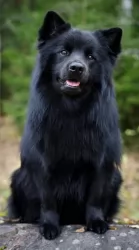 This is a Spitz type of dog from Sweden. It is Sweden’s national dog.The dog has always been used for herding and guarding livestock such as reindeer for the Sami people.
This is a Spitz type of dog from Sweden. It is Sweden’s national dog.The dog has always been used for herding and guarding livestock such as reindeer for the Sami people.
The dog is much the same as the Finnish Lapphund, and some even believe that it might be one and the same. The American Kennel Club recognizes them as two separate breeds.
It is one of the oldest Swedish dog breeds and also one of 3 Lapphund breeds.The Swedish Kennel Club recognized the Lapphund as a distinct breed in 1903.
The Federation Cynologique Internationale recognized this dog in 1944, and the United Kennel Club in 2006.
 The original Bandogs were bred for guarding and protecting. It is believed that the dogs were developed from eastern shepherds, the American Pit Bull Terrier and Mastiffs and crossed with western Bullenbeissers and hounds, and it is thought that the hybrid breed came into existence way back, around 1250-1300 in Middle England.
The original Bandogs were bred for guarding and protecting. It is believed that the dogs were developed from eastern shepherds, the American Pit Bull Terrier and Mastiffs and crossed with western Bullenbeissers and hounds, and it is thought that the hybrid breed came into existence way back, around 1250-1300 in Middle England.
Although it isn’t possible to say exactly how the Bandog originated, it is certain that the dogs were bred with a functional purpose – to guard and protect. In fact in the late 1960s a veterinarian by the name of Swinford started a breeding program, even though breeders of Bandogges disagree on the breeds that went into Swinford's original breeding scheme. It is believed to have been 50% American Pit Bull Terrier and 50% molosser.
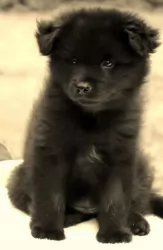 The Swedish Lapphund is a medium to large sized dog standing at between 40 to 51cm in height and weighing between 19 and 21kg.
The Swedish Lapphund is a medium to large sized dog standing at between 40 to 51cm in height and weighing between 19 and 21kg.
The head is wedge shaped and the ears erect. He has a thick double coat with fairly straight, silky hair that stands out from the body. Colors can be brown or black and sometimes there can be white markings. He sheds quite a bit, with some heavier seasonal shedding.
When you get one of these Spitz type dogs as your pet, you can be sure that you’re going to have an excellent pet and companion.
They’re independent dogs with strong wills and like to do their own thing. Training and socialization can change that and make him easy, well mannered and obedient.
They’re lively dogs and intelligent too. He is versatile, loving to be outdoors and being energetic with the children but being able to enjoy some quiet time indoors too. He is simply an excellent family pet and watchdog.
 The Bandog is a powerful, stocky, muscular dog with small, upright ears. His tail is long and tapered, but most people prefer to have the tail docked. With his broad skull, wide shoulders and powerful chest, he is also confident and intelligent. He is a rugged dog, heavily boned and muscled, and quite aggressive when provoked. This characteristic comes from the intentional breeding to combine the courage and tenacity of an American Pit Bull Terrier with the size of the Bull Mastiff and its guarding instincts.
The Bandog is a powerful, stocky, muscular dog with small, upright ears. His tail is long and tapered, but most people prefer to have the tail docked. With his broad skull, wide shoulders and powerful chest, he is also confident and intelligent. He is a rugged dog, heavily boned and muscled, and quite aggressive when provoked. This characteristic comes from the intentional breeding to combine the courage and tenacity of an American Pit Bull Terrier with the size of the Bull Mastiff and its guarding instincts.
Even though the breed has a history of competitive fighting, today when he is trained and socialized he can be a devoted, controlled and amicable family pet, even getting on well with children and being social and affectionate with his human family members. They can be aggressive with strangers, more so if provoked or threatened by them.
Bandogges are able to get along with other animals in the home if they are raised with them, but can be aggressive with pets they aren’t familiar with. You won’t find a better guard dog and with his low barking tendencies, he quietly watches, waiting to go for any intruders.
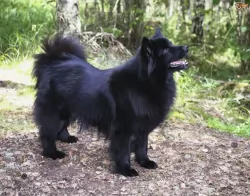 The Swedish Lapphund has always been a hardworking dog, herding reindeer for the Sami people.
The Swedish Lapphund has always been a hardworking dog, herding reindeer for the Sami people.
Today the Lapphund is a people-loving dog and wants to be constantly with his human family. He is intelligent, strong, independent, loyal, bold and loving. If you’re looking for an excellent family companion, this is it.
Do him a favor and don’t leave him outside without human companionship as he will become run-down and possibly destructive through no fault of his own. Bring him into your family and make him part of it and then he’s happy.
 This is certainly an intimidating looking breed, having been developed from a variety of stock breeds, Because of this, there isn’t a standard set for the dog and his appearance can vary. He isn’t recommended for first-time dog owners, because he is quite complex – being both docile and aggressive – not your regular dog. He will certainly require an owner who shows them who is boss.
This is certainly an intimidating looking breed, having been developed from a variety of stock breeds, Because of this, there isn’t a standard set for the dog and his appearance can vary. He isn’t recommended for first-time dog owners, because he is quite complex – being both docile and aggressive – not your regular dog. He will certainly require an owner who shows them who is boss.
The Bandog may well have a reputation of being a fighter, but once he has had training and socialization, he turns out to be just a gentle giant. With a strong, firm owner, he is good with children too and becomes a devoted guardian to the entire family.
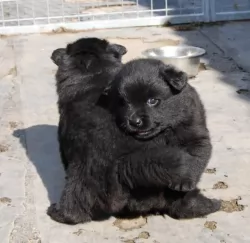 The Swedish Lapphud is a healthy dog breed, but even so he can get one of the many common dog illnesses there are.If you choose a puppy, make sure to get your pet from a reputable breeder to avoid more serious dog illnesses.
The Swedish Lapphud is a healthy dog breed, but even so he can get one of the many common dog illnesses there are.If you choose a puppy, make sure to get your pet from a reputable breeder to avoid more serious dog illnesses.
Diabetes Mellitus is a disease you might have to watch out for with this dog breed.
This is a disease of the pancreas. This organ has two groups of cells – one produces enzymes for proper digestion and the other produces the hormone insulin which regulates the level of glucose in the bloodstream.
Diabetes is when the pancreas fails to regulate blood sugar. Your dog will have increased thirst and urination, weight loss, and increased appetite.
Type I diabetes mellitus results from destruction of the insulin-producing beta cells, which is the most common type of diabetes in dogs. Dogs with this type of diabetes require insulin injections to stabilize blood sugar. Type II diabetes is more likely in older, obese dogs.
Dogs with diabetes mellitus will require insulin each day. If canine diabetes mellitus is properly regulated, prognosis for the dog is good.
 Your Bandog is generally a robust, healthy breed, but he may well be prone to health concerns. Some of these are hip and elbow dysplasia and Bloat
Your Bandog is generally a robust, healthy breed, but he may well be prone to health concerns. Some of these are hip and elbow dysplasia and Bloat
This is an abnormal formation of the hip socket that can, if left unattended, lead to lameness and painful arthritis of the joints. eye problems.
His size and his deep chest also mean he is prone to bloat. Known as gastric dilatation and volvulus, this isn’t good for your dog as the stomach becomes distended with gas, putting pressure on the diaphragm, which can cause breathing problems.
Just because your Bandog is a healthy breed, it doesn’t mean your puppy is immune from his puppy shots. Your puppy will need his first vaccinations from 6 to 8 weeks of age for parvovirus, distemper, rabies and hepatitis.
Check your country’s vaccination regulations, because in the United States, most states require that all dogs be vaccinated against rabies.
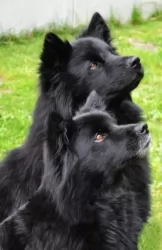 ●The Swedish Lapphund is an active dog and will require a high quality dog food. If you buy commercially manufactured dog food it should be appropriate to your dog’s age and activity levels.
●The Swedish Lapphund is an active dog and will require a high quality dog food. If you buy commercially manufactured dog food it should be appropriate to your dog’s age and activity levels.
Home-made food like boiled chicken, brown rice, spinach and sweet potatoes will do your pet the world of good, and chopped up, it can be added a couple of times a week to the dog’s dry kibble.
Try and feed some raw met occasionally as well. Clean, fresh water should be available at all times.
●The Lapphund is an active dog and he is going to reguire daily exercise that will keep him mentally and physically fit. Having a dog like this requires you being active yourself, and your Lapphund is going to love going on long walks or hikes. He will never get enough games with the children – he just loves the rough and tumble.
● Have his vaccines attended to. There are training classes as well as boarding kennels that won’t accept your dog unless his vaccines are up to date.
● Have your dog spayed or neutered if you don’t want your dogs to have puppies.
● Brush his coat twice a week. Check inside his ears and inside his mouth for redness and infection.
 These large, short-haired dogs have a short coat and they are easy to groom. Remove loose hair with a rubber brush twice a week. The breed is an average shedder and if you start regular brushing from when he is a young dog, he will be happy to let you do it as an adult. Check his ears and eyes regularly and clip his toe nails.
These large, short-haired dogs have a short coat and they are easy to groom. Remove loose hair with a rubber brush twice a week. The breed is an average shedder and if you start regular brushing from when he is a young dog, he will be happy to let you do it as an adult. Check his ears and eyes regularly and clip his toe nails.
The Bandog is an energetic breed that will require a good deal of exercise. This is one breed you can’t leave alone in your garden day after day. He will require games and walks to avoid boredom and frustration.
The Bandog puppy will grow and develop quickly, so his diet should be good quality dog food. He is big and thirsty and there must be a ready source of clean drinking water. Because he is inclined to drool, his water bowl will need to be cleaned out regularly to avoid him drinking contaminated water.